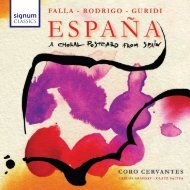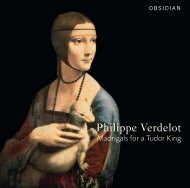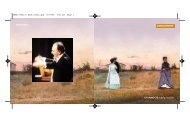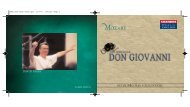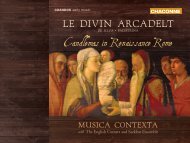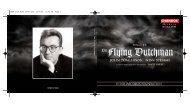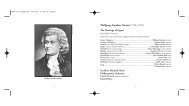CHAN 10153 BOOK.qxd - Chandos
CHAN 10153 BOOK.qxd - Chandos
CHAN 10153 BOOK.qxd - Chandos
- No tags were found...
You also want an ePaper? Increase the reach of your titles
YUMPU automatically turns print PDFs into web optimized ePapers that Google loves.
<strong>CHAN</strong> <strong>10153</strong> <strong>BOOK</strong>.<strong>qxd</strong> 20/4/07 12:00 pm Page 8the assassin kills the wrong man, driving Ephrosiniamad. In a final colour sequence, Ivan promises to bemerciless against Russia’s enemies.Given Prokofiev’s immersion in opera at the time, itis unsurprising that Ivan is a heavily stylised andextraordinarily operatic film, with music as an integralpart of the narrative. But, as so often, Prokofievshared music between projects; Anastasia’s theme andthe Polonaise come from an unstaged 1936production of Pushkin’s Boris Godunov, and the Finaleappears in War and Peace as Kutuzov’s aria, making athree-way parallel between defenders of Russia:Ivan–Kutuzov–Stalin. Eisenstein worked closely withProkofiev, providing vividly detailed descriptions andsketches as guides for the composer, or alternativelyfilming or editing sequences to cues that Prokofievhad already written.Part One was released in 1944, and won a StalinPrize. But in Part Two Eisenstein made Ivan (and, byimplication, Stalin) crueller and more paranoid, andhis actions less justifiable. As the film industry entereda period of increased repression, Ivan was one ofseveral films that were banned in 1946, with work onPart Three being stopped altogether (Prokofiev wroteno music for the few minutes that were filmed). Inearly 1945 Prokofiev had been hospitalised withconcussion, but though he continued to compose hedid not rework his music from Ivan as he had Kizhéand Nevsky. In 1948 Eisenstein died and Prokofiev,feeling that he could not hope to find a bettercollaborator, decided that his cinema career was over.He died on 5 March 1953 (ironically, on the same dayas Stalin). The second part of the film was finallyreleased in 1958.Various attempts have been made to create aconcert work from the music, including oratorioscompiled by the film’s soundtrack conductor AbramStasevich in 1962 and by Michael Lankester. TheConcert Scenario arranged by Christopher Palmer isrecorded on <strong>Chandos</strong> (<strong>CHAN</strong> 8977). The presentrecording includes all Prokofiev’s music heard in thefilm plus a series of liturgical texts sung in OldChurch Slavonic.Ballad of an Unknown Boy, Op. 93One of several wartime patriotic works by thecomposer, this cantata uses a poem by PavelAntokolsky (1896–1973) which Prokofiev saw in theperiodical Literature and Art while living in Tblisi,though he finished writing his work in Alma-Ata.It tells of a boy whose mother and sister are killedby the Nazis and who exacts revenge by blowingup a carload of German officers. Although hisidentity remains a mystery, his actions are aninspiration to others. It is one of several ofProkofiev’s works that feature or were intended forchildren, and this may have strengthened his bondwith Eisenstein in whose films cruelty to children is aconstant theme.Prokofiev’s wartime works had mixed fortunes andthe cantata was not one of his successes; its premiereon 21 February 1944 was the only performanceduring his lifetime. It was criticised both in privateand in public: Myaskovsky felt it lacked melody, whilefor Shostakovich it was too episodic (ironically its Nazimarch is as repetitive as that in Shostakovich’sSeventh Symphony). But these were the inevitableresults of Prokofiev’s approach; the vocal line is moredeclamatory than melodic and he chose to illustratethe words quite closely, an approach that iscomparable to film work. But following Antokolsky’sfast-moving text made it difficult to build a largerstructure, and rather it is a series of colourful scenes.After its single outing Prokofiev noted: ‘The Boy, I’msorry to say, has been trampled to death.’© 2003 John RileyFormed in 1971 with some of the most talentedstudents from the Moscow State Conservatory, theRussian State Symphonic Cappella quicklydeveloped a reputation within Russia. At the Guidod’Arezzo International Competition of PolyphonicChoirs, held in Italy, it won both Gold and BronzeMedals and Valeri Polyansky received a special prizeas best choral conductor. Many invitations fromabroad followed and the Cappella has sung inCanada, Europe and the Far East, with critics praisingits diverse repertoire and faultless vocal technique.The Russian State Symphony Orchestra was foundedin 1962. Gennady Rozhdestvensky became PrincipalConductor in 1981 and his energy and commitmentpaved the way forward for a vital new burst ofcreativity and achievement for the Orchestra. It hastoured throughout the world, performing and recordinga varied repertoire that includes all the symphonies ofBruckner and Shostakovich, and the music ofHonegger, Schnittke and Vaughan Williams. ValeriPolyansky took over as Principal Conductor in 1992and contributed to the continuing expansion of theOrchestra by successfully merging it with the RussianState Symphonic Cappella. Under his leadership it hasbecome one of the very best Russian ensembles,alternating symphonic performances with thoseperformed with the choir.After graduating from the Moscow State Conservatory,Valeri Polyansky studied opera and symphonicconducting under Odissey Dimitriada and later underGennady Rozhdestvensky. He began his professionalcareer conducting at the Bolshoi Theatre, and wasappointed Principal Conductor of the Russian StateSymphony Orchestra in 1992. He has been ArtisticDirector of the Russian State Symphonic Cappella forover twenty-five years and has led both ensembles inmajor productions throughout the world includingIceland, Finland, Turkey and the Far East. Under hisdirection their repertoire has been extended toembrace music from the baroque era through to thatof contemporary composers of many nationalities.Among his numerous artistic achievements have beencritically acclaimed performances of Eugene Onegin atthe Gothenburg Musical Theatre and his appointmentas Principal Conductor of the Opera Nights Festival inGothenburg.8 9



